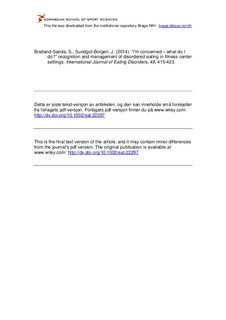| dc.contributor.author | Bratland-Sanda, Solfrid | |
| dc.contributor.author | Sundgot-Borgen, Jorunn | |
| dc.date.accessioned | 2015-06-03T11:08:48Z | |
| dc.date.available | 2015-06-03T11:08:48Z | |
| dc.date.issued | 2014-05-08 | |
| dc.identifier.citation | International Journal of Eating Disorders. 2014, 48, 415-423 | nb_NO |
| dc.identifier.uri | http://hdl.handle.net/11250/284514 | |
| dc.description | I Brage finner du siste tekst-versjon av artikkelen, og den kan inneholde ubetydelige forskjeller fra forlagets pdf-versjon. Forlagets pdf-versjon finner du på www.wiley.com: http://dx.doi.org/10.1002/eat.22297 / In Brage you'll find the final text version of the article, and it may contain insignificant differences from the journal's pdf version. The original publication is available at www.wiley.com: http://dx.doi.org/10.1002/eat.22297 | nb_NO |
| dc.description.abstract | Objective:
To examine group fitness instructors' knowledge and attitudes toward identification and management of disordered eating (DE).
Method:
Group fitness instructors representing the three largest fitness center companies in Norway (n = 837, response rate: 57%) completed a questionnaire through Questback (www.questback.com). The questionnaire contained items regarding gender, age, educational background, exercise behavior, and knowledge of recognition and response to DE.
Results:
Eighty-nine percent of the respondents reported knowledge about symptoms of DE, 29% was classified with adequate DE knowledge skills. Forty-nine percent of the instructors reported current concern about DE among one or more members, 47% reported knowledge about how to recognize and respond to DE, and 37% reported knowledge about their fitness center's guidelines for approaching DE concerns. The level of formal education in sports and exercise, and a history of self-reported eating disorder, but not fitness instructor experience, were explanatory factors for knowledge about DE symptoms. Both exercise specific educational level and instructor experience were explanatory variables for knowledge about recognition of and response to DE concerns.
Discussion:
Implications of the findings include a need for increased confidence among group fitness instructors regarding how to approach DE concerns, increased awareness of excessive/compulsive exercise as a symptom of DE, and enhanced dissemination of existing guidelines for managing DE concerns among members and/or staff. | nb_NO |
| dc.language.iso | eng | nb_NO |
| dc.publisher | Wiley | nb_NO |
| dc.subject | sports | nb_NO |
| dc.subject | exercise | nb_NO |
| dc.subject | dieting | nb_NO |
| dc.subject | psychiatry | nb_NO |
| dc.subject | eating disorders | nb_NO |
| dc.title | “I'm concerned – What do I do?” recognition and management of disordered eating in fitness center settings | nb_NO |
| dc.type | Journal article | nb_NO |
| dc.type | Peer reviewed | nb_NO |
| dc.subject.nsi | VDP::Medical disciplines: 700 | nb_NO |
| dc.source.journal | International Journal of Eating Disorders | nb_NO |
| dc.description.localcode | Seksjon for idretssmedisinske fag / Department of Sports Medicine | nb_NO |
